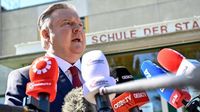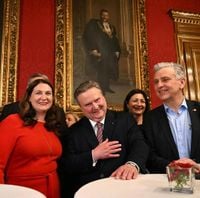In a decisive outcome for the 2025 Vienna municipal elections held on April 27, the Social Democratic Party of Austria (SPÖ) has managed to secure its position as the leading party in the capital, despite experiencing a slight decline in voter support. With approximately 39.5 percent of the votes, the SPÖ, led by Mayor Michael Ludwig, remains the dominant political force, although this represents a loss of over two percentage points compared to the previous election.
The Freedom Party of Austria (FPÖ) celebrated a significant resurgence, nearly tripling its share of the vote to approximately 20.5 percent, marking an increase of about 13 percentage points from the last election cycle in 2020. This remarkable turnaround comes in the wake of a dismal performance during the previous election, which was marred by the 'Ibiza scandal' involving former FPÖ leader Heinz-Christian Strache.
The Green Party also performed well, securing around 14.5 percent of the votes, effectively maintaining its position from the last election. Meanwhile, the Austrian People's Party (ÖVP) faced a dramatic decline, potentially falling below the 10 percent threshold, down from 20.4 percent in 2020. The NEOS, who have been coalition partners with the SPÖ, saw a slight increase to approximately 9.9 percent.
Voter turnout for the elections was reported at 62.7 percent, with over 1.4 million eligible voters participating in the electoral process. The degree of counting was over 99 percent, with projections indicating a fluctuation range of 0.3 percentage points.
Despite the SPÖ's losses, the party is now presented with a range of coalition options. Mayor Ludwig expressed satisfaction with the election results, describing them as a "strong vote of confidence from the people of Vienna." He indicated plans to begin exploratory talks with potential coalition partners, including the NEOS and the Greens, as well as the ÖVP, although a coalition with the FPÖ has been ruled out.
In a significant shift, the FPÖ's resurgence can be attributed to its focus on immigration and rising youth crime rates in Vienna, issues that resonated with many voters. The party's performance stands in stark contrast to its previous election results, where it garnered only 7 percent of the vote in 2020.
Strache's attempt to make a political comeback with his own party, Team HC Strache – Alliance for Austria, was met with disappointment as he received only around 1.1 percent of the votes, failing to reach the five percent threshold necessary for representation in the council. The Communist Party of Austria (KPÖ) also narrowly missed entering the municipal council, securing only 4 percent of the votes.
As the dust settles on the election, the implications for Vienna's political landscape are profound. The SPÖ, while still the largest party, must now navigate a more complex coalition environment, potentially leading to a shift in governance dynamics. The FPÖ's gains signal a changing tide in voter sentiment, particularly concerning issues of security and immigration, which may influence future political strategies across the spectrum.
Looking ahead, the remaining absentee ballots, totaling 284,956, will be counted on April 28, 2025, with results from preferential votes also expected to be announced on the same day. This final tally could further impact coalition discussions and the overall political landscape in Vienna.
In summary, the Vienna elections of 2025 have not only reaffirmed the SPÖ's leadership but also highlighted the growing influence of the FPÖ and the shifting priorities of the electorate. As negotiations for a new coalition begin, the political future of Vienna remains uncertain yet dynamic, reflecting the evolving concerns of its citizens.






